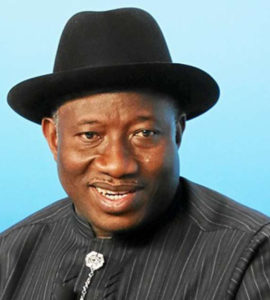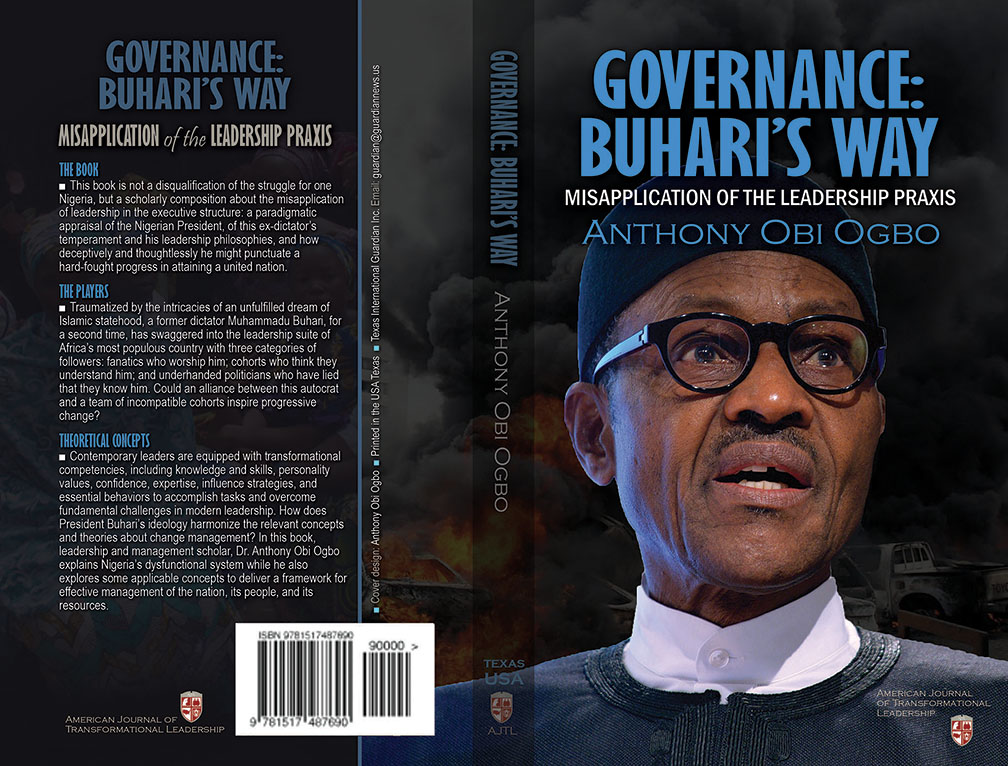■ In the very conservative Nigeria’s learning community, celebrating a self-inflicted failure is inconceivable. Why would anybody idolize a loser for doing just about what any loser would do – admit and accept his loss? For goodness sake, why would anyone glorify a leader who erred, lost, gave up, and ran off?
From the book: Governance Buhari’s Way – The Misapplication of Leadership Praxis (Published April 2016)
By Dr. Anthony O. Ogbo
The mere fact that a sitting President and his first lady could not pass the card-accreditation process they initiated, should indicate that the election was destined for disaster. The incumbent President and presidential candidate of the People’s Democratic Party, Goodluck Ebele Jonathan, and his First Lady, Patience, were declined by the card reader at his home town, Otuoke in Bayelsa State. This caused the whole accreditation process that preceded Nigeria’s 2015 general election to draw mixed reactions.
The crux of the matter was that, Professor Attahiru Jega, to whom President Jonathan entrusted the electoral sector, the Independent National Electoral Commission (INEC), could no longer be trusted with supervision. A thread of events that occurred before a postponement of the initial ballot date clearly revealed that the INEC boss might have been compromised to rig the process in favor of his kinsman. The Professor hails from the North, being the same region as Muhammadu Buhari of the All Progressive Congress (APC) who was Jonathan’s major opposition. As President Jonathan and his wife struggled with accreditation, General Buhari, and his wife, Aisha Buhari, were accredited without any hitch in their home town, Duara, Katsina.

President Jonathan, rather unwisely, totally failed to read the handwritings on the wall about Professor Jega’s poor supervision, process unpreparedness, suspicious partisan engagements, lack of transparency, and his boldfaced ability to lie to his country regarding the supervisory readiness of the ballot process. This President failed to learn from the history and reality of his country’s electoral process – that the sitting President reserves the absolute power over the head of the electoral sector, and could remove him for significant reasons. Yet Jega prevailed uninterrupted even when it was obvious that INEC had lost its credibility to deliver ballot fairness or credibility.
Another blunder that wrecked President Jonathan in his quest for a next tenure was the oversight of his campaign team. While the opposition, APC were ceaselessly overrunning the voting population with campaign propaganda, runners of President Jonathan’s campaign were busy scrambling and garnering funds for their personal interests. Does it bother Jonathan that Colonel Sambo Dasuki, his former National Security Adviser allegedly diverted $2.1 billion meant for arms purchase for other unrelated matters? It was alleged that these funds were diverted into President Jonathan’s presidential campaign coffer, but prevalent records show no such connections. Yet it is troubling that these fraudulent activities occurred undetected and unchecked, right under Jonathan’s watch.
In a post-election scrutiny of the current Nigerian political system, it must be noted that both the People’s Democratic Party (PDP) and All Progressive Congress (APC) are still in denial about their roles and flaws in this past general election. Let the truth be told – that President Jonathan and his PDP handlers, unwisely stumbled, while General Buhari and his APC handlers deceitfully usurped victory. PDP claimed Jonathan stepped down out of humility to avoid an anticipated post-election violence, whereas APC branded Buhari a hero who won because Nigerians wanted a change of system. For the records, it must be noted that, letting ‘him’ have ‘yours’ out of ignorance is not humility, it is stupidity. Similarly, victory by deception doesn’t make one a hero, but a rogue. Hence, there were no heroes in Nigeria’s 2015 ballot calamity; neither were there any humble losers. However, there was a confused incumbent, surrounded by selfish handlers, who watched tactlessly while some inglorious rogues absconded with his throne in a typical “daylight snatch-and-grab” assault manner.
After any election, especially in a race as controversial as the PDP-APC presidential polls, a “postmortem” is compulsory. This enables the players explore relevant thoughts about their performances. Winners are engrossed in strategizing about implementing projections, whereas losers evaluate their losses to make amends.
“There were no heroes in Nigeria’s 2015 ballot calamity; neither were there any humble losers. However, there was a confused incumbent, surrounded by selfish handlers, who watched tactlessly while some inglorious rogues absconded with his throne in a typical “daylight snatch-and-grab” assault manner.”
Hence, managing failure remains one of the best part of effective governance. In organizational leadership, failure is not unacceptable. What might be disastrous is when managers fail to immediately assess measures, and reconcile their lapses. However, in the Nigerian system, the situation is ab solutely the opposite. Most winners are immediately occupied with infighting over their opportunities to loot public funds. The others are busy lampooning losers with foul language for losing. Losers on their own part are enthralled in some “don’t blame it on me” mentality.
Even before the presidential inauguration, some losers had already abandoned their political ideologies, “carpet-crossing”, to shower the winning Presidential candidate with congratulatory messages in order to scheme for appointed positions. This is Nigeria – a system where the application of politics as a tool for national development lacks merit. In this system, politics is about resources sharing, geo-political zoning, power-grabbing and treasury looting – all at the expense of the poor and impoverished constituents.
Another devastating part of post-election party politics is a campaign by President Jonathan’s handlers, categorizing him as a martyr and hero for accepting his disgraceful defeat. To make matters worse, President Jonathan absconded after his loss, leaving his party hopeless without leadership. This attitude reveals another side of his temperament; a lack of courage to reorganize his disciples and weather the political storm. Rather than reconvene to access and reconcile a cocktail of mistakes that precipitated and aggravated their failure, the PDP went amok in the social media to glorify a leader who erred, lost, gave up, and ran off.
In the very conservative Nigeria’s learning community, celebrating a self-inflicted failure is inconceivable. Why would anybody idolize a loser for doing just about what any loser would do – admit and accept his loss? For goodness sake, why would anyone glorify a captain who miscalculated, derailed, admitted failure, and abandoned his ship?
In the complex world of organizational leadership, rewarding excellence makes sense because it encourages a culture of hard work, perseverance, and operational efficacy. Rewarding excellent behaviors also create a functioning environment of ethical decency. President Jonathan was a good leader endowed with core transformational competencies that could have moved his country further to inseparable unity if he had triumphed for a second tenure. He must be acknowledged for humbly accepting his loss, but proclaiming him a hero in a race he disgracefully handled and fled, simply sends the wrong message about motivating success and managing excellence.
As stated earlier in this book, failure in transformation management is not a taboo but a challenge that could be managed through identifying and reconciling ambiguities; and resolving them strategically to create a better future. As entrepreneurship scholar, Scott Shane noted, people will not try to do new things if they know that they would be punished for failing. Thus, as a culture, tolerating failure, in fact, makes organizations more innovative and effective. Jonathan and PDP’s disastrous election outing must not be outlawed as an incorrigible measure; neither must their failure be scorned as disgrace. Rather, the whole process must be recorded as a learning curve – a platform – to reorganize and move on. Nevertheless, to glorify this failure might translate to a scorn of excellence.
♦ Dr. Anthony Obi Ogbo, Publisher of International Guardian is the facilitator of The American Journal of Transformational Leadership
♦ THE BOOK This book is not a disqualification of the struggle for one Nigeria, but a scholarly composition about the misapplication of leadership in the executive structure: a paradigmatic appraisal of the Nigerian President, of this ex-dictator’s temperament and his leadership philosophies, and how deceptively and thoughtlessly he might punctuate a hard-fought progress Nigeria has made in attaining a united nation. See BOOK. >>


Leave a Reply